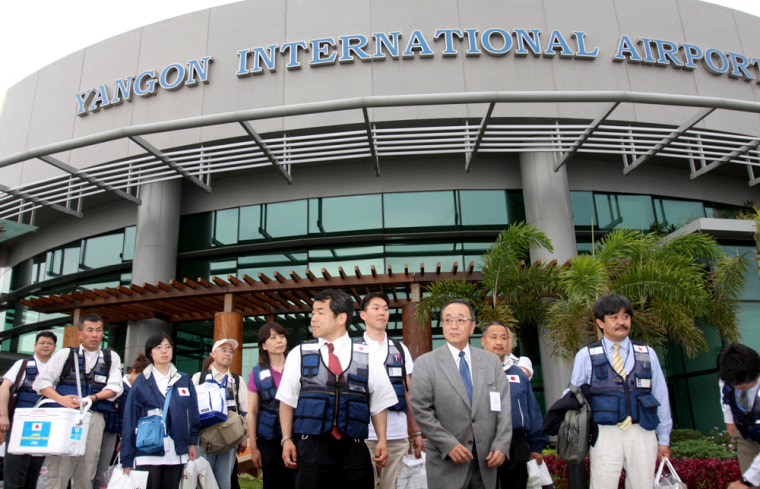Myanmar's ruling junta lashed out at aid donors who promised millions of dollars for cyclone relief, saying survivors didn't need "bars of chocolate."
The criticism came Thursday, a day after global powers expressed outrage at Myanmar's decision to extend pro-democracy leader Aung San Suu Kyi's house arrest for a sixth straight year.
State-run media decried donors for only pledging up to $150 million — a far cry from the $11 billion the junta said it needed to rebuild. The Myanma Ahlin newspaper, a government mouthpiece, said cyclone victims from the hardest-hit areas could get by without foreign handouts.
"People from the Irrawaddy delta can survive on their own, even without bars of chocolate donated by the international community," it said, adding they can live on "fresh vegetables that grow wild in the fields and on protein-rich fish from the rivers."
The reference to chocolate bars appeared to be metaphorical. No aid agency is known to be distributing chocolate, which would not be practical in the country's tropical heat. Paul Risley of the U.N.'s World Food Program, which is directing the effort for emergency food supplies, said his agency provides rice, ready-to-eat meals of rice and beans and high-energy biscuits.
The storm left an estimated 2.4 million people in desperate need of food, shelter and medical care, according to the U.N. Myanmar’s government says the cyclone killed 78,000 people and left 56,000 missing.
Junta apparently wary
Myanmar’s leaders are leery of foreign aid workers and international agencies, worrying they could weakened the junta’s grip on power. The generals also don’t want their people to see aid coming directly from countries like the United States that the junta has long treated as a hostile power.
The newspaper commentary also slammed an unnamed monetary institution, saying its refusal to help cyclone survivors was "an act of inhumanity."
World Bank Managing Director Juan Jose Daboub said last week that the bank would not extend any financial aid or loans to Myanmar because it has not paid its debts for a decade.
The article said the same countries that criticized Myanmar for not opening its door to aid workers were being stingy with relief aid. It appeared to single out the United States without naming it.
"There is one big nation that extended economic sanctions on Myanmar even before it was known that a powerful cyclone was going to strike Myanmar," it said.
Nevertheless, in an apparent sign that the isolationist government planned to keep its promise to allow in humanitarian workers from all countries, the United Nations reported that dozens of visas had been approved for international relief workers to enter the country.
The last 45 pending visas were granted to U.N. staffers, while Save the Children, Doctors Without Borders and the U.N. Children's Fund — UNICEF — have sent more than 14 workers in recent days into the delta region, a U.N. statement said.
Japan, which has so far donated $13 million in aid, sent a 23-member medical team to the country Thursday, the Foreign Ministry said in Tokyo.
The junta only agreed to allow foreign aid workers in after U.N. Secretary-General Ban Ki-moon met with leader Senior Gen. Than Shwe last weekend.
World powers keep up pressure
While garnering some praise for opening up to the international aid community, global powers have voiced outrage at a decision by the government to extend the detention of pro-democracy leader Aung San Suu Kyi just days after donors pledged large sums of money to help the cyclone victims.
Several countries, including the United States, Britain and France, issued biting statements about the regime’s order to keep the Nobel peace laureate under house arrest for a sixth year.
“This measure testifies to the junta’s absence of will to cooperate with the international community,” French Foreign Minister Bernard Kouchner said in a statement.
He called on Myanmar’s government to “free without delay” Suu Kyi and other political prisoners and opposition members being held. Suu Kyi has been held for more than 12 of the past 18 years, becoming a symbol of the junta’s intolerance of dissent.
Many nations critical of Myanmar’s abuses had put politics aside to help survivors of Cyclone Nargis. Representatives from 50 nations pledged up to $150 million Sunday, while remaining quiet about Suu Kyi’s plight.
The regime considers its biggest threat to be Suu Kyi, daughter of the country’s martyred independence leader, Gen. Aung San. She was awarded her Nobel prize in 1991 for her nonviolent attempts at promoting democracy and is widely popular.
Under Myanmar law, people deemed security threats can be detained for a maximum of five years without trial. The regime has not officially announced its decision to extend Suu Kyi’s detention or explain why it is violating its own law. An official confirmed the extension, but insisted on not being quoted by name because he was not authorized to speak to the media.
New constitution adopted
State radio and television announced on Thursday night that Myanmar had adopted a new constitution. Critics say the constitution is designed to perpetuate the military’s decades-old grip on power, and questioned the fairness of the referendum.
The government reported a 98 percent voter turnout and said 92 percent of the voters approved the charter. There were widespread unofficial reports of voting irregularities.
The referendum was held as scheduled on May 10, but some voting had to be postponed to May 24 for areas of the country hard-hit by Cyclone Nargis.
